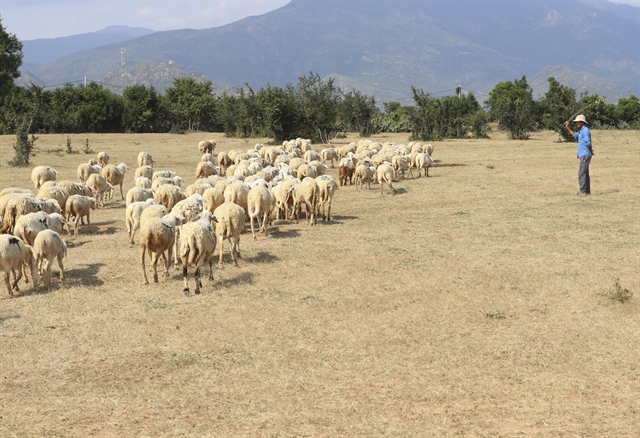 Society
Society


|
| Sheep bred in Ninh Thuận Province’s Bác Ái District. — VNA/VNS Photo Nguyễn Thành |
NINH THUẬN — The south central province of Ninh Thuận will spend more than VNĐ743 billion (US$33 million) over the next decade to make animal husbandry safe, efficient and lucrative.
By 2030, it plans to increase the number of sheep to 220,000 and goats to 160,000.
The province has the country’s largest number of sheep as its dry weather and soil are suitable for breeding the animal.
It also breeds large numbers of goats, cows, oxen, pigs, and poultry.
Lê Huyền, deputy chairman of its People’s Committee, said the focus would be on restructuring agriculture together with building new-style rural areas.
To meet the plan targets, the province will zone concentrated livestock farming areas, develop animal husbandry based on organic and bio-safety standards, implement digital transformation, use advanced techniques to improve the quality of broodstock, and improve animal health sanitation and disease prevention and control.
It will create conditions to encourage investment in animal breeding areas with advanced techniques, feed processing plants and broodstock farms.
Its localities will zone pastures and instruct animal breeders to grow new grass varieties with high yields and quality.
It will establish more co-operatives and co-operative groups to breed animals under value chains, and develop geographical indications and brand names for animal products to improve their competitiveness.
Localities will boost trade promotion and develop new models that combine livestock breeding with agriculture-related tourism.
Relevant agencies will closely monitor animal breeding, transportation, trade, and slaughter and penalise violations.
Nearly 78 per cent of the province is mountainous and semi-mountainous, which suits animal farming.
Sheep farmed in the country only meet 10 per cent of demand for meat.
But the province also faces difficulties such as shrinking natural pastures, small scale of animal breeding and lack of linkages between stakeholders in breeding, processing and distribution of animals.
Most farmers sell their animals to traders. VNS